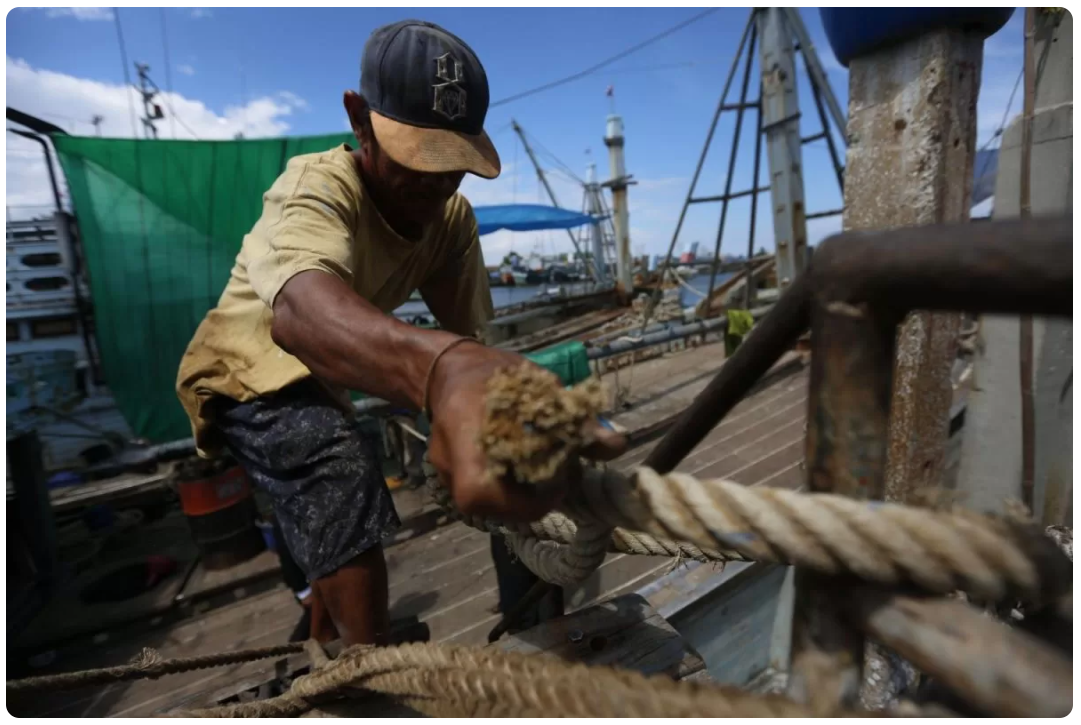10 Oct 2025: Ending IUU fishing, forced labour
(Information Source: Bangkok Post, on Fri Oct 10, 2025)

Crewmen are seen aboard an unregistered fishing trawler found during a survey in Samut Sakhon in June 2018. (Photo: Pattarapong Chatpattarasill)
'He promised me a high salary and a bonus from the captain every time the ship docks.'
In 2013, Rizky Oktaviana was recruited to work on a Taiwanese fishing vessel in Cape Town with promises of high pay that would improve his quality of life.
Instead, he endured 22-hour working shifts, verbal abuse, and unsafe conditions. He and his crewmates were forced to work, even if they were ill, or the weather was dangerous. When the ship was detained for suspected illegal, unreported, and unregulated (IUU) fishing, Rizky and 73 other Indonesians were abandoned in Cape Town, detained without any legal representation, and left uncompensated after repatriation.
With the support from the Union of Indonesian Migrant Workers (SBMI), IOM, and International Transport Workers' Federation (ITF) Cape Town, Rizky was released and later joined SBMI as a paralegal, eventually becoming the Coordinator of the Maritime Department. His journey embodies the resilience of fisher-led advocacy: despite systemic exploitation, fishers like Rizky have transformed personal hardship into collective leadership. In 2017, Rizky succeeded in advocating the inclusion of migrant fishers as migrant workers in Indonesian law.
In September, Rizky shared his experience at two panels during the regional UN Responsible Business and Human Rights (UN RBHR) Forum in Bangkok.
The panels were co-organised by Greenpeace Southeast Asia, SBMI, Environmental Justice Foundation (EJF), Better Engagement Between East and Southeast Asia (BEBESEA), Human Rights Working Group, Human Rights Now (HRN), Indonesian Ocean Justice Initiatives (IOJI), and others.
ENVIRONMENTAL AND HUMAN EXPLOITATION AT SEA
Rizky's ordeal is not an isolated tragedy but a mirror of the systemic link between forced labour and IUU fishing. Both thrive under secrecy, weak enforcement, and the global seafood industry's race to the bottom. Vessels that flout conservation rules are often the same ones that cut corners on labour rights. Overfishing drives boats further offshore for longer periods, making isolation at sea a tool to silence migrant fishers. Illegal transshipments not only enable unreported catches but also extend forced labour conditions, trapping workers for months or even years without reprieve.
The symbiotic relationship of overfishing and labour exploitation within the seafood industrial complex feeds on abuse and sustains environmental destruction. The concentrated power of US and EU brands also benefit from obscure traceability and cheap supply. The result is a system that extracts maximum value from the sea while treating fishers as disposable. As oceans get warmer and fish populations migrate or decline, vessels push further into remote waters. At the same time, climate-driven migration increases the pool of people seeking work and a better life. Environmental degradation and labour exploitation are locked in a feedback loop, with climate stress accelerating both.
This raises two urgent questions: what role and commitment can the Association of Southeast Asian Nations (Asean) bring to enhance the regional protection of migrant fishers, and what concrete commitments can businesses make to respect their human rights? When Asean leaders adopted the Asean Community Vision 2045, they pledged to combat IUU fishing. Yet, two years later, Southeast Asia remains a site of both ecological plunder and human suffering.
THE FUTURE OF SUSTAINABLE SEAFOOD IS SLAVERY FREE
Back to the recent UN event, Greenpeace Southeast Asia and allies asked Asean to move from promises to enforceable action. Asean has been called on to deliver on three urgent fronts: a stronger regional enforcement against IUU fishing, an integration of migrant fishers' rights to environmental governance, and a recognition that sustainable oceans demand rights-based protection from businesses.
We believe that the way forward is to confront IUU fishing as both an environmental and a human rights issue. That means mandatory tracking of vessels, banning transshipments at sea, and ensuring transparency of fisheries data. Retailers and global seafood buyers have a critical role to play: they must refuse to profit from IUU fishing practices sustained by slavery at sea. Slavery-free and sustainable seafood should not be a niche demand but the baseline expectation.
Together with an alliance of civil society organisations, labour unions, and business stakeholders, Greenpeace Southeast Asia co-drafted and signed a Joint CSOs and Multistakeholders Statement. It highlights the Asia-Pacific fishing industry's systemic challenges: gender-blind policies, persistent gaps between obligations and protections, and the urgent need to embed human and environmental rights in development goals. Asean's upcoming declarations on the Right to Development and on the Right to a Safe, Clean, Healthy, and Sustainable Environment will ring hollow if enforceable standards (like ratifying the ILO Work in Fishing Convention [C-188] to strengthen regional fisheries management) remain unchecked.
Fildza Nabila Avianti is Oceans Campaigner (Legal and Human Rights) at Greenpeace Indonesia.

